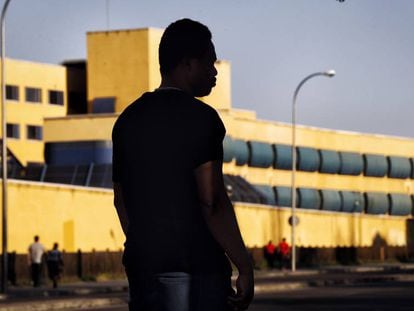Spanish government reduces irregular immigration by half
Spain is no longer the main Mediterranean route for undocumented migrants, with arrivals falling from 64,298 in 2018 to 24,159 this year


The Spanish executive has reached its goal of reducing irregular immigration by half, a decision that was taken in January after arrivals in 2018 reached a record 64,298 people.
The latest official data shows 24,159 undocumented arrivals, marking the first time since 2010 that there has been such a steep drop in immigration by land and sea.
One out of every 100 migrants continues to die at sea
This decrease is largely owed to renewed efforts by Morocco to stop migrants from departing from its coastline.
“The preventive efforts by Moroccan authorities continue to be effective, and they are key to understanding the strong reduction in arrivals in Spain during 2019,” said the European Commission in an internal report to which EL PAÍS has had access. Those efforts include, among other things, preventing thousands of departures by land and the rescue of 10,700 migrants who were returned to Moroccan territory, adds the report.
Thanks to this assistance, in just a few months Spain has gone from being the main Mediterranean route for irregular immigration to showcasing itself as a role model in Europe. Spain and its European partners want to reinforce cooperation with Morocco, which has been rewarded diplomatically and financially with aid worth €180 million.
Immigrant deaths at sea have not dropped by as much. So far this year, 317 people have drowned or disappeared in the Strait of Gibraltar and the westernmost portion of the Mediterranean as they attempted to reach Spain, a 42% drop from 2018. One out of every 100 migrants continues to die at sea.
The preventive efforts by Moroccan authorities continue to be effective
In 2018, record arrivals put irregular immigration at the top of the political agenda. Migratory pressure had been increasing since 2017, but the opposition claimed there was a push effect because of the Socialist (PSOE) administration’s decision to take in humanitarian vessels that had been rejected by Malta and Italy, such as the Aquarius NGO vessel.
Since then, the caretaker government of Socialist Party (PSOE) Prime Minister Pedro Sánchez has adopted tougher measures, including pushback policies at the border between Morocco and the Spanish exclave cities of Ceuta and Melilla, and preventing NGO-run humanitarian ships from sailing to the central Mediterranean.
While sea arrivals are more visible, a majority of immigrants arrive by air. Although it is impossible to know how many people on tourist visas extend their stay, asylum requests have ballooned to 82,000 so far this year, a figure that is largely due to Venezuelans and Colombians who make up 32% and 23% of asylum seekers, respectively.
English version by Susana Urra.












































